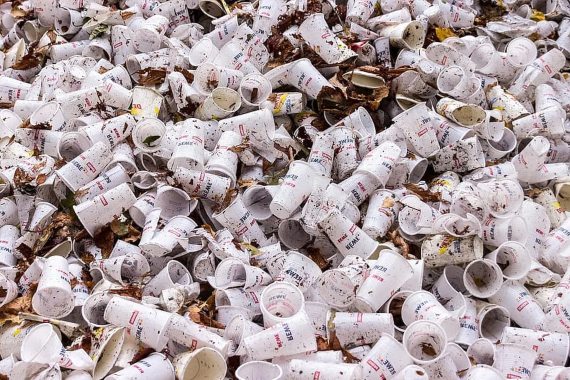During the first months of the SARS-CoV-2 coronavirus pandemic, the collapse of industrial and transport activity led to a sharp drop in greenhouse gas emissions across the globe. However, even then experts were already warning against the illusion that the scourge of COVID-19 would have a bright side; it was only a temporary mirage. What is more, the consequences of the pandemic are aggravating a now classic environmental problem of human civilisation, that of waste. The widespread use of masks and gloves, the increased consumption of disposable products for fear of contagion, and even the impact of the pandemic on waste treatment systems, threaten to leave a grim legacy on the health of our planet as well.
As the coronavirus was spreading around the world, and with it the protection measures against infection, environmental groups were already beginning to report that the waste from the pandemic was invading the oceans, and that soon there would be “more masks than jellyfish in the waters of the Mediterranean,” in the words of Laurent Lombard of the French organisation Opération Mer Propre. According to the United Nations Conference on Trade and Development, global sales of disposable masks will increase more than 200-fold this year, from $800 million in 2019 to $166 billion in 2020, and 75% will end up in landfills or in the seas.
Hospital waste
“Coronavirus waste has become a new form of pollution,” warned the World Economic Forum. At a time when awareness of the problem of plastic waste and its effects on the oceans is greater than ever, the UN stressed: “The fight against plastic pollution is being hit by the COVID-19 pandemic.” Some experts predict that the rubbish generated by masks is “an environmental disaster that could last for generations,” all the more so as the degradation of this waste over time will increase the problem of micro-plastic pollution. But geologists go much further, predicting that this crisis will leave a permanent mark on the planet’s geology through the fossilisation of masks and gloves, which will end up in riverbeds and lake bottoms and then become covered in sediment and integrated into the Earth’s geological history.

However, some of this new waste being generated is almost inevitable; the pandemic has imposed the urgent need to strengthen the protection of health workers who are in contact with the sick. Personal Protective Equipment (PPE) includes disposable items such as masks, gloves and gowns, as well as containers of disinfectant gels and numerous other medical products. At the height of the pandemic in Wuhan, the hospitals of this Chinese city were producing six times as much waste as normal; 247 tonnes of hospital waste accumulated each day, which forced the authorities to set up new waste treatment facilities.
In less developed countries, this hospital waste ends up in landfills, sometimes without the slightest health controls, as has been reported in India. At best, it is burned in incineration plants, a treatment that not only eliminates the biological risk and prevents the accumulation of waste, but also provides a usable and sustainable source of energy thanks to the heat generated. In modern plants, the toxic and greenhouse gases generated during incineration are filtered out to limit environmental pollution. But despite all this, according to sustainability specialist Carly Fletcher of Manchester Metropolitan University, “by destroying these materials, incineration does not align with the circular economy, which aims to maintain material value”; the burning of PPE means that more materials have to be produced to make new equipment. Fletcher believes that once the urgency of the pandemic subsides, consideration should be given to transitioning to the use of reusable, sterilisable, recyclable or biodegradable PPE.
More wasted food and disposable packaging
The increase in the amount of rubbish in these times of pandemic is not limited to protective materials. Restaurant closures and supply chain cuts have led to the accumulation of mountains of wasted food, the decomposition of which generates greenhouse gases that exacerbate climate change. In addition, online sales have skyrocketed, increasing the consumption of disposable packaging, and the fear of contagion from objects has revived the popularity of single-use plastics. There has been a trend for years to encourage reusable containers in countless coffee shops around the world. However, the pandemic has slowed this momentum; both large chains and local establishments have returned to disposable cups, and even some bans on other plastics and single-use containers have been left in quarantine, despite the fact that so far, according to the European Centre for Disease Control, the transmission of the virus from contaminated surfaces has not been documented, and some experts have down-played this risk. Even if contact with objects could pose a real threat, single-use plastics would not be exempt either.

In addition to the above, the confinement of populations across the globe also affected the waste collection and recycling sector. In the United Kingdom, a study in April revealed that 46% of recycling facilities had stopped operating. A similar situation occurred in other countries, and in Italy infected people were even banned from separating waste. Although the progressive reactivation of economic and social life has lessened this problem, experts insist on the need to strengthen and improve waste management systems in the face of the ongoing pandemic and against similar future threats, since the transition to a circular economy depends on the collection and recycling of waste as a raw material. This is especially true when the collapse of oil prices due to the pandemic made the production of new plastics much cheaper, in line with the classic scheme of the linear economy.
Recommendations to improve waste management
In short, the experts stress that it is everyone’s task, from governments to individuals, to ensure that this global public health crisis does not make terrestrial ecosystems even sicker. The World Economic Forum called on the international community: “Governments need to act now to ensure a green recovery that incentivises sustainability.” The United Nations Environment Programme has published a series of recommendations to improve waste management during the pandemic.

In many countries, regulatory authorities are now recommending that citizens use reusable cloth masks, reserving single-use surgical masks and masks with high particle retention to those who really depend on these resources, the healthcare community. A study by University College London found that machine-washed fabric masks without disposable filters minimise the environmental impact, while hand-washing reusable masks with disposable plastic filters is the most environmentally damaging option, even more so than fully disposable face masks. It is up to each of us to follow these recommendations and try to preserve the health of our common home, even in these dark times; as a group of experts from Monash University (Australia) wrote: “Avoiding single-use plastic can still be part of the new normal.”
Comments on this publication